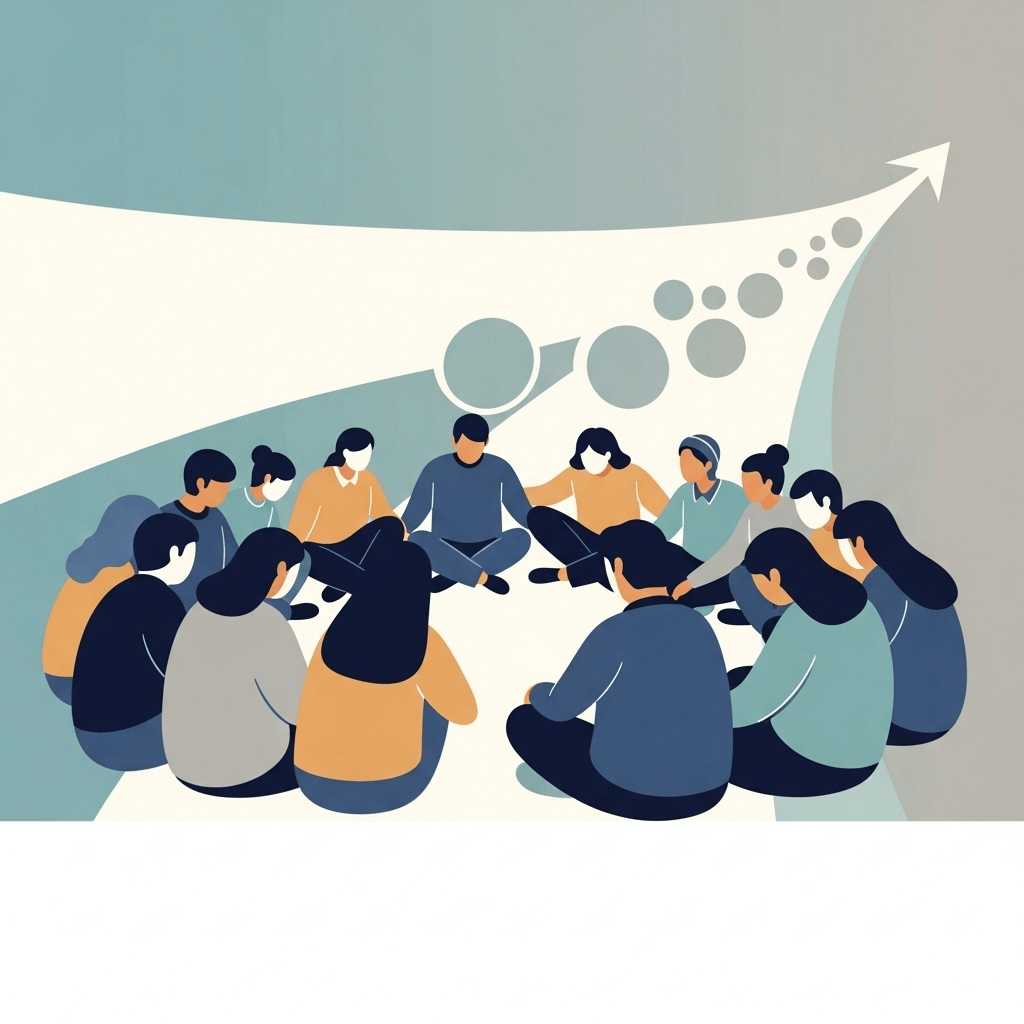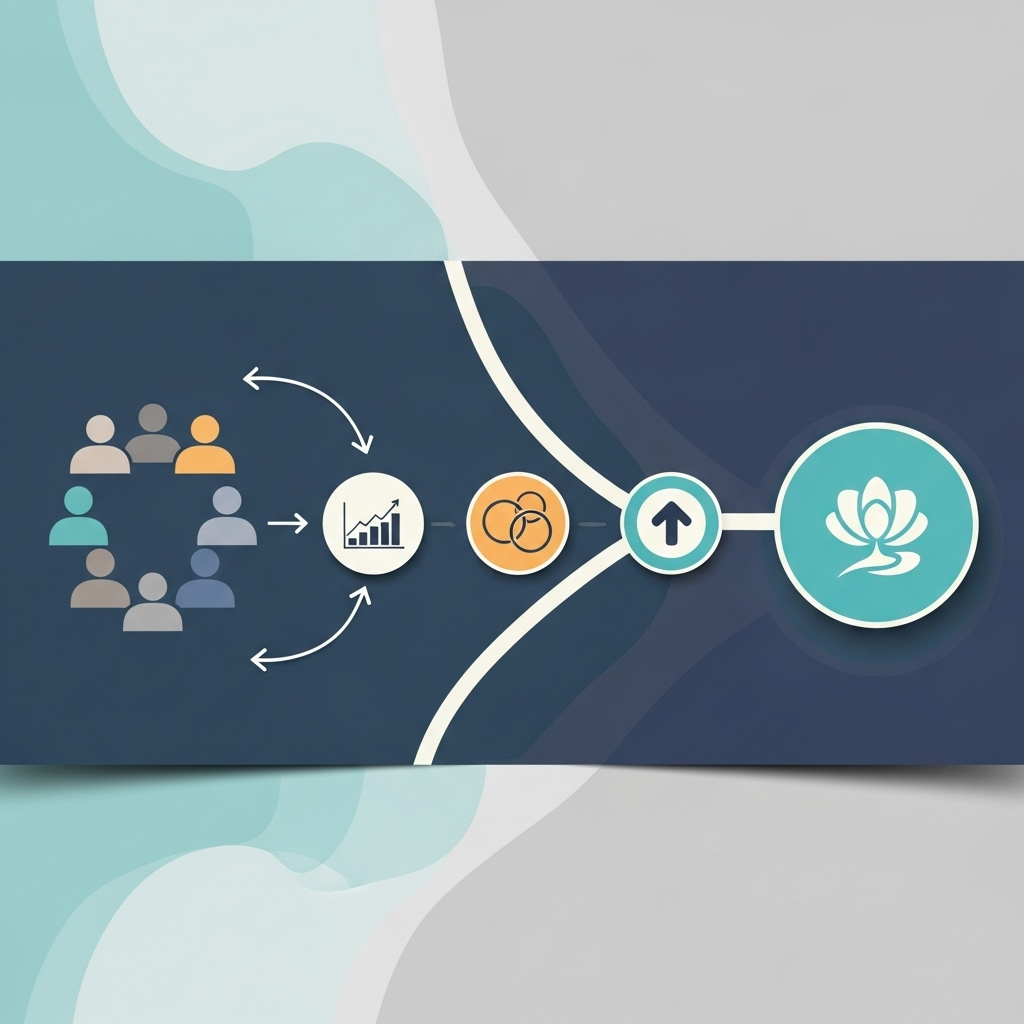More Than Just a Support Circle
Picture this: you're sitting in your therapist's office for the twentieth time, discussing the same patterns, the same struggles, and wondering if you're the only person on Earth who can't seem to get their life together. You're not alone in feeling this way. Recent data shows that demand for mental health services has skyrocketed by over 40% since 2020, with many individuals seeking more than traditional one-on-one therapy can offer.
While individual therapy remains a cornerstone of mental health treatment, there's a lesser-known but equally powerful option that's transforming lives across the country: group therapy. This isn't your typical support group where people simply share their problems over coffee and cookies. Group therapy is a structured, evidence-based form of psychotherapy led by a licensed professional, where a small group of individuals with similar challenges come together in a dynamic therapeutic environment.
The rise of online therapy platforms has revolutionized access to group sessions, making this powerful healing modality more accessible than ever before. What was once limited by geography and scheduling constraints can now happen from the comfort of your own home. This blog explores the scientifically-backed benefits of group therapy and why it might be the missing piece in your mental health journey.
The Science of Shared Healing: How Group Therapy Works
Group therapy operates on a deceptively simple but profound principle: healing happens through connection and interaction with others who truly understand your struggles. It's not just talking—it's transforming. The group setting creates a microcosm of the real world where members can safely practice new behaviors, test different ways of communicating, and receive immediate feedback from peers who have walked similar paths.
The therapist's role extends far beyond simply moderating discussions. A trained professional facilitates each session, ensuring psychological safety while guiding conversations toward therapeutic breakthroughs. They provide expert insight, help process difficult emotions, and ensure that group dynamics remain healthy and productive.
The Four Pillars of Group Healing

Renowned psychiatrist Irvin Yalom identified key therapeutic factors that make group therapy uniquely effective. Here's how these principles translate into real-world healing:
"You're Not Alone" (Universality):The moment you realize that others share your exact struggles, something profound shifts. That crushing isolation that whispers "you're broken" suddenly loses its power. At Prescott House, we've witnessed countless moments where clients experience this revelation—sometimes it happens in the first group session, sometimes it takes weeks, but when it clicks, the relief is palpable.
"Helping Heals You" (Altruism):There's something magical about offering support to someone else that simultaneously heals your own wounds. When you help a fellow group member navigate their anxiety or addiction, you're not just being kind—you're actively rewiring your brain to see yourself as capable and valuable.
"Seeing is Believing" (Instillation of Hope):Hope isn't just positive thinking; it's witnessing tangible proof that recovery is possible. When you watch someone who was struggling just like you make meaningful progress, it becomes impossible to maintain that "I'm hopeless" narrative.
"A Social Laboratory" (Developing Social Skills):Group therapy provides a safe space to practice real-world interactions with immediate, honest feedback. You can test new ways of setting boundaries, learn to communicate anger appropriately, or practice vulnerability without the usual social consequences.
Breaking Down the Barriers: Common Myths About Group Therapy
Despite its proven effectiveness, group therapy faces significant misconceptions that prevent people from accessing this powerful healing modality. Let's address the most persistent myths head-on:
"I'm Too Private for Group Work"

Many people believe they're "too private" or introverted for group therapy. This misconception stems from imagining group sessions as forced vulnerability exercises where you must immediately share your deepest secrets. In reality, skilled group therapists create environments where privacy is respected and disclosure happens naturally over time.
You control how much you share and when. Some group members participate primarily by listening and offering support to others for weeks before sharing their own experiences. At Prescott House, we've seen reserved individuals gradually find their voice as they witness others' courage and feel the safety that authentic group connection provides.
"Other People's Problems Will Overwhelm Me"
This concern assumes that group therapy involves drowning in everyone else's trauma and difficulties. Professional group therapists are trained to balance sharing time, prevent any single member from monopolizing sessions, and ensure that the overall tone remains hopeful and solution-focused.
More importantly, hearing others' struggles often provides perspective rather than additional burden. Many participants report that learning about others' resilience and coping strategies actually strengthens their own emotional toolkit.
"It's Just Cheaper Than Individual Therapy"
While group therapy is often more cost-effective than individual sessions, choosing it solely for financial reasons misses the unique therapeutic benefits that simply cannot be replicated in one-on-one therapy. The group dynamic itself is the medicine—not a watered-down version of "real" therapy.
Who Benefits Most from Group Therapy?
While group therapy can benefit virtually anyone seeking personal growth or healing, certain individuals and situations are particularly well-suited to this approach:
People Struggling with Isolation
If depression, anxiety, or life circumstances have left you feeling disconnected from others, group therapy provides structured social connection with purpose. Unlike casual social activities, group sessions focus on meaningful interaction and mutual support, making them less overwhelming for socially anxious individuals.
The shared focus on growth and healing removes the pressure of small talk or maintaining facades. Everyone understands that you're there to work on yourself, creating permission to be authentic in ways that regular social situations don't allow.
Those Working Through Specific Challenges
Specialized groups targeting specific issues—such as grief, addiction recovery, trauma, or relationship problems—allow members to learn from others who truly understand their experience. A grief group, for example, provides insights that well-meaning friends who haven't lost a spouse simply cannot offer.
At Prescott House, our addiction recovery groups demonstrate this principle powerfully. When someone shares their struggle with cravings, other group members can offer practical strategies that have worked for them, creating a peer-to-peer learning environment that complements professional guidance.
Individuals Seeking Interpersonal Growth
If your mental health challenges stem from relationship patterns, social anxiety, or communication difficulties, group therapy offers real-time practice opportunities. You can try new ways of expressing yourself, setting boundaries, or handling conflict with immediate feedback from both peers and the facilitator.
This makes group therapy particularly valuable for those dealing with social anxiety, codependency, anger management issues, or family-of-origin trauma that affects current relationships.
The Modern Evolution: Online Group Therapy in 2025
The digital revolution has transformed group therapy accessibility and effectiveness in remarkable ways. Online group therapy platforms have eliminated geographical barriers, scheduling constraints, and many of the logistical challenges that previously prevented people from accessing this powerful treatment modality.
Breaking Geographic and Time Barriers
Rural residents who previously had no access to specialized therapy groups can now join sessions with others facing similar challenges nationwide. Working parents can participate in evening groups without worrying about commute time. Individuals with mobility limitations or chronic illnesses can access consistent support without physical travel demands.
This increased accessibility has led to more diverse group compositions, enriching the therapeutic experience with varied perspectives and backgrounds that might not exist in smaller geographic communities.
Enhanced Comfort and Participation
Paradoxically, the slight physical distance of online sessions often increases emotional intimacy and participation. Many individuals find it easier to share vulnerably when they're in their own safe space, leading to deeper therapeutic work than they might initially achieve in face-to-face settings.
The option to turn off cameras during particularly emotional moments or to have comfort objects nearby creates additional safety that can accelerate the therapeutic process. For individuals with social anxiety or trauma histories, this controlled environment often feels less threatening than traditional in-person groups.
Taking the First Step: Your Path to Healing Together
The journey toward mental health and recovery doesn't have to be a solitary struggle. Group therapy offers something that individual therapy, self-help books, and well-meaning advice from friends simply cannot provide: the transformative power of shared healing with others who truly understand your experience.
We've explored how group therapy works through the four pillars of universality, altruism, hope instillation, and social skill development. We've debunked common myths that prevent people from accessing this powerful resource and highlighted how modern technology has made group therapy more accessible and effective than ever before. Most importantly, we've seen how the group dynamic itself becomes a catalyst for change—not just a setting where change might happen.
The evidence is clear: group therapy isn't just an alternative to individual therapy; it's often the missing piece that accelerates healing and creates lasting transformation. Whether you're struggling with addiction, anxiety, depression, trauma, or relationship challenges, there's likely a group of people who share your specific struggles and are ready to walk alongside you toward recovery.
At Prescott House, we've witnessed countless individuals discover strengths they never knew they possessed through the power of group connection. We've seen quiet observers find their voice, isolated individuals build meaningful relationships, and people who felt "unfixable" realize they were simply healing in the wrong environment. The magic happens not despite our differences, but because of how our shared humanity transcends individual struggles.
If you've been considering therapy but feel stuck in patterns that individual sessions haven't quite broken through, or if you're seeking connection with others who truly understand your journey, group therapy might be the breakthrough you've been looking for. With both in-person and online options available, there's never been a better time to explore this evidence-based path to healing.
Remember, seeking help isn't a sign of weakness—it's an act of courage. And choosing to heal alongside others? That's recognizing the profound truth that we're not meant to struggle alone. Your story matters, your healing journey is valid, and somewhere, there's a group of people ready to remind you that you're not just surviving—you're capable of thriving.
Ready to explore how group therapy could transform your healing journey?Contact Prescott House todayto learn more about our group therapy programs and take the first step toward healing together. Your future self will thank you for having the courage to begin.
References
- The Benefits of Group Therapy: Why It Works - Center for Anxiety
- Benefits of Group Therapy - Carolina Dunes Behavioral Health
- Group therapy is as effective as individual therapy, and more efficient. Here's how to do it successfully - American Psychological Association
- Group Therapy - StatPearls - NCBI Bookshelf
- Group vs. Individual Therapy: Which is Best? - Talkspace
- Why You Should Try Online Group Therapy | Charlie Health
- Online group therapy helps adults with anxiety and depression, new review finds
- The Benefits of Group Therapy Online: Canada Mental Health Support | BetterHelp













